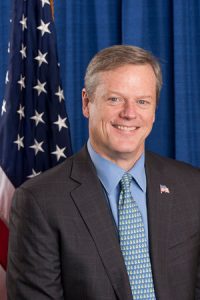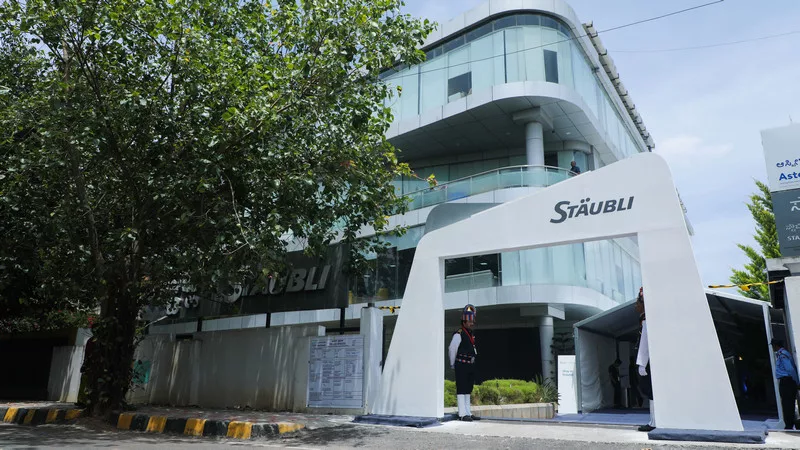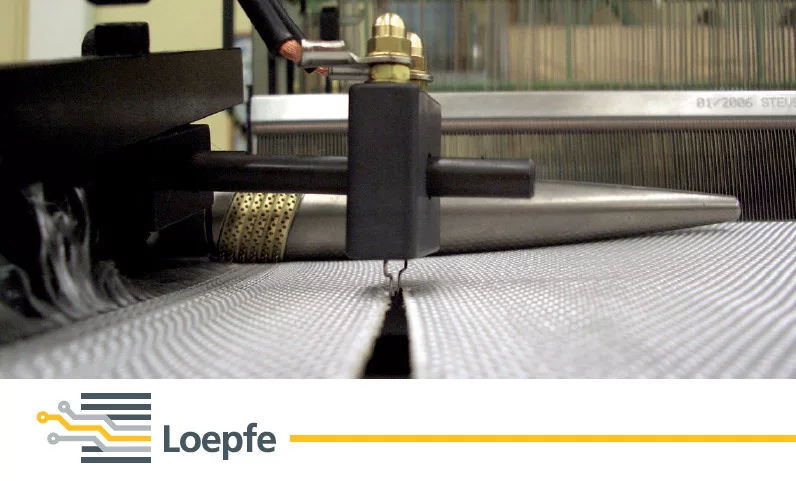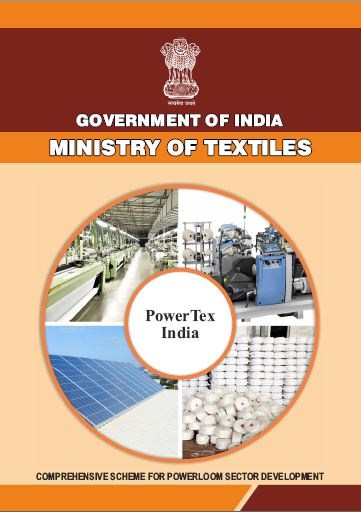Awards support commercialization of technologies in flexible, hybrid electronics and advanced functional fabrics by Innovation in Advanced Manufacturing
May 31, 2017
The Baker-Polito Administration has announced awards totaling $11.3 million to UMass Lowell to fund the creation of future technologies that will revolutionize the way fabrics are made and reinvent the textile industry in Lowell.
A $10 million grant will allow UMass Lowell to create a new Fabric Discovery Center, a unique, testing and development facility that will usher in the nation’s first collaborative investment between two Manufacturing Innovation Institutes. The facility will serve Massachusetts and the region to rapidly transform textile product concepts into functional prototypes, serving as an end-to-end innovation ecosystem for researchers and private sector partners as they work towards commercialization of revolutionary technologies.
UMass Lowell will also receive a total of $1.3 million to support three projects with private industry partners, SI2 Technologies in Billerica and Raytheon in Waltham. Funding will allow UMass Lowell to acquire new equipment to develop new materials and polymers that can be used in flexible, hybrid electronics. Combined with over $2 million in federal and industry funds for these projects, these investments will create the foundation for future technological advancements, providing necessary resources to bring technology from research prototype to pilot scale for commercialization with industry partners.
“Massachusetts is a competitive player in the global innovation economy because of our leadership in technology, strong workforce and educational institutions,” said Governor Charlie Baker. “This investment will ensure we continue to see that success and growth outside of Greater Boston, and that Lowell will have an opportunity to return to the center of the textile industry and its future. We look forward to bringing these manufacturing innovation institutes together for this first-of-its-kind collaboration that will deliver new advancements in textile manufacturing, economic investment and job growth.”
“This investment is an important statement about our efforts to support the future of manufacturing here in Massachusetts,” said Lieutenant Governor Karyn Polito. “There is no limit to the potential impact the technologies tested and delivered here will have on the advanced manufacturing sector in Lowell and the Commonwealth.”
These two grants will benefit two Manufacturing Innovation Institutes in Massachusetts: the Revolutionary Fiber and Textile Manufacturing Innovation Institute and the Manufacturing Innovation Institute for Flexible Hybrid Electronics. These institutes are both members of the Manufacturing USA network, previously known as the National Network for Manufacturing Innovation, a network of competitively awarded public-private innovation institutes focused on advanced manufacturing. Manufacturing USA funds private-public partnerships to increase American manufacturing competitiveness and catalyze new advanced manufacturing technologies.
In April 2016, US Secretary of Defense Ash Carter announced that Advanced Functional Fabrics of America (AFFOA), in Massachusetts, was selected to serve as the national lead for the Revolutionary Fiber and Textile Manufacturing Innovation Institute, a $317 million public-private partnership. The institute also includes several other key public and private sector partners from across the nation, focused on a common goal of revolutionary fiber and textile manufacturing.
In August 2015, the Baker-Polito Administration announced that UMass Amherst was selected to serve as the New England regional lead in the Manufacturing Innovation Institute for Flexible Hybrid Elextronics, led by NextFlex. The Innovation Institute in Massachusetts was created in partnership with UMass Lowell, MIT, Harvard, Northeastern University and private industry. Flexible Hybrid Electronics (FHE) focuses on using sensors printed into thin ribbons of plastic to replicate functions performed by semi-conductor chips found in computers and other electronic devices.
“We know that Massachusetts brings together the unique elements necessary for this type of collaboration: academic institutes, private industry and the commitment to innovation,” said Housing and Economic Development Secretary Jay Ash. “This discovery center will allow for collaboration across initiatives, and this revolutionary research will further reinvigorate Lowell, the birthplace of the textile industry.”
“Massachusetts is already on the cutting edge of advanced manufacturing, and by bringing together two Manufacturing Innovation Institutes, the Fabric Discovery Center will put us on the cutting edge of the cutting edge,” said Senator Eileen Donoghue. “The investments the state is making will bring tremendous economic benefits to Greater Lowell and to the entire commonwealth.”
“Manufacturing and the textile industry have a long and proud history in Lowell, so I am very pleased that Governor Baker and his economic team are making this announcement here in the heart of our city,” said Representative David Nangle. “In collaboration with the University of Massachusetts Lowell, I am certain that these grants will provide the institutes with the funding and expertise they will need to expand this industry, create jobs, and further enhance the city’s reputation as an eager partner in moving our local and state economy forward.”
Governor Baker made the announcement at 110 Canal Street, the Innovation Hub (iHub) at UMass Lowell, which has received significant state funding from the Executive Office of Housing and Economic Development, MassDevelopment and the Massachusetts Life Sciences Center. The iHub is located in Lowell’s Hamilton Canal District, which received $4.7 million in funding from the Baker-Polito Administration under the MassWorks program for redevelopment efforts.
“The UMass Lowell Fabric Discovery Center is a first-of-its-kind in the Department of Defense (DoD) portfolio of manufacturing innovation institutes, providing a unique joint usage capability for collaborative work in flexible electronics and smart fibers and textiles,” said Tracy Frost, Director, DoD Manufacturing USA Institutes & Acting Director, DoD ManTech. “The commitment of funding by the Commonwealth of Massachusetts and UMass Lowell are essential elements to realizing the DoD goals of creating a robust manufacturing ecosystem that leverages these regional strengths, but also acts as a critical node in a national network of DoD-led institutes.”
“We thank the Baker-Polito Administration for recognizing and investing in UMass’s Lowell’s significant research, economic development and public-private partnership capabilities,” said UMass President Marty Meehan. “UMass Lowell’s historic expertise in fibers and textiles underpins its current innovation leadership in advanced fibers and flexible electronics. There is truly no better place to leverage these M2I2 matching funds for the benefit of the Commonwealth.”
“With our ongoing leadership in the development of advanced fibers and textiles, medical textiles and flexible electronics, today’s announcement continues UMass Lowell’s strong partnership with Advanced Functional Fabrics of America, NextFlex, the U.S. Army and the Commonwealth to build the future of high-tech manufacturing in Lowell and across the nation,” said UMass Lowell Chancellor Jacquie Moloney.
“This grant positions UMass Lowell as a national leader in the development, prototyping and testing of advanced fibers and textiles, fabrication techniques and integrated technologies,” said Julie Chen, vice chancellor for research and innovation at UMass Lowell. “It demonstrates our support of startups and companies, large and small, in accelerating technology translation and workforce development in partnership with the public sector.”
“The Lowell Fabric Discovery Center represents a first step in implementing AFFOA’s nationwide strategy of centers designed to encourage entrepreneurship in advanced fabrics,” said Dr. Yoel Fink AFFOA CEO. “We are particularly excited to work hand-in-hand with UMass Lowell and local manufacturers, educational institutions and state governments to facilitate the creation of these centers which will serve to accelerate startups, provide workforce development and house advanced fabric prototyping facilities. We are particularly grateful to the Governor and State Legislators for delivering on this significant commitment to manufacturing and product innovation.”
“NextFlex congratulates UMass Lowell and the Commonwealth of Massachusetts on the launch of the Fabric Design Center. We enthusiastically support this innovation and look forward to partnering on development of manufacturing processes for integrating Flexible Hybrid Electronics (FHE) into textiles,” said Malcolm J. Thompson, Executive Director of NextFlex. “The opportunity to work together marks an important milestone in the advancement of FHE and ‘smart fabrics,’ and we will all benefit greatly from our collaboration. We are very enthusiastic of contributing to creating ROI to our members and achieving increased Economic Development in Massachusetts.”
“We are excited to have received this NextFlex award. The state’s support in helping the team to meet the cost share requirements made the proposed effort possible,” said Dr. Joseph Kunze, SI2 Technologies’ President and CEO. “I believe that the approach the state is taking in supporting the Manufacturing USA institutes is an excellent model for partnering between the state, small businesses, and academia. It is positioning Massachusetts as the leader in the advanced manufacturing economy. The NextFlex award to the SI2 team is an excellent example of that.”
Manufacturing USA seeks to spur research into cutting-edge technologies that can be applied to advanced manufacturing processes. Bidders frequently form teams of universities, companies and non-profits across different states, with regional nodes supporting the lead bidder. The federal awards are leveraged several times over through a series of state and industry matches.
The Baker-Polito Administration’s Massachusetts Manufacturing Innovation Initiative (M2I2) provides a vehicle for matching federal Manufacturing USA awards, and help Massachusetts manufacturers adopt innovative new technologies. The Baker-Polito Administration has committed $100 million in funding over five years to initiatives in Massachusetts. Under M2I2, Massachusetts is convening a national effort to develop revolutionary fibers and textiles, and the state is a participant in regional manufacturing innovation institute nodes in robotics, photonics, flexible hybrid electronics, biopharma manufacturing, smart manufacturing, and rapid process intensification.
About AFFOA
Advanced Functional Fabrics of America (AFFOA) is a non-profit; its mission is to enable a domestic manufacturing-based revolution by transforming traditional fibers, yarns, and fabrics into highly sophisticated, integrated and networked devices and systems. AFFOA leads the convergence of advanced technology into fiber and textile production to commercialize fabric products that deliver value-added services to the user. Through AFFOA’s activities fabrics that see, hear, sense, communicate, store and convert energy, regulate temperature, monitor health and change color will soon be possible to benefit the consumer and warfighter. AFFOA, headquartered in Cambridge, Massachusetts, is a public/private partnership, the 6th DoD manufacturing innovation institute and a member of the Manufacturing USA network. For more information visit AFFOA.ORG.
About NextFlex
NextFlex is a leading force in the Manufacturing USA network of Institutes. Formed in 2015 through a cooperative agreement between the US Department of Defense (DoD) and FlexTech Alliance, NextFlex is a consortium of companies, academic institutions, non-profits and state, local and federal governments with a shared goal of advancing U.S. manufacturing of FHE. Since its formation, NextFlex’s elite team of thought leaders, educators, problem solvers, and manufacturers have come together to collectively facilitate innovation, narrow the manufacturing workforce gap, and promote sustainable manufacturing ecosystems. For more information, visit www.nextflex.us and follow NextFlex on LinkedIn, Facebook and Twitter.






